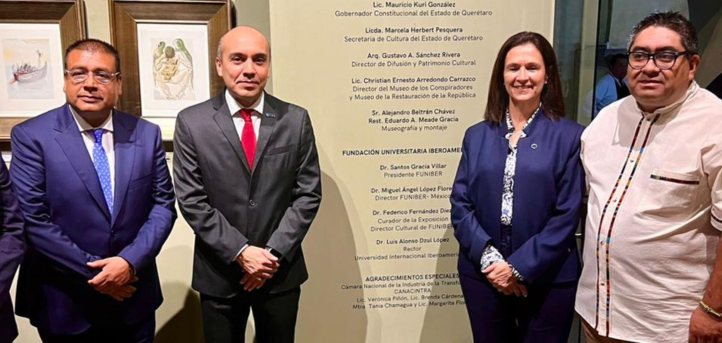The Museo de los Conspiradores en Querétaro (Museum of the Conspirators in Querétaro) (Mexico) is hosting the exhibition “The Divine Comedy by Salvador Dalí, in collaboration with the Obra Cultural de FUNIBER and UNEATLANTICO (Cultural Work of FUNIBER and UNEATLANTICO), the Universidad Internacional Iberoamericana (International Iberoamerican University of Mexico, UNINI Mexico), and the Secretary of Culture through the Dirección de Difusión y Patrimonio Cultural de Querétaro (Queretaro’s Cultural Heritage and Diffusion Department).
The Dalí exhibit is on display in the temporary exhibition hall of the Museo de los Conspiradores located in the heart of Querétaro’s historic center. It will be available to visit until February 4 next year from Tuesday to Sunday between 10:30 a.m. and 6:30 p.m.
The opening event of the exhibition was attended by Dr. Miguel Ángel López Flores, director of FUNIBER Mexico; Dr. Luis Dzul López, rector of UNINI Mexico; Ms. Marcela Herbert Pesquera, head of the Secretary of Culture of the State of Querétaro; Mr. Gustavo Sánchez, director of Diffusion and Cultural Heritage; and Mr. Christian E. Arredondo Carrazco, person in charge of the museum’s management.
Dalí’s “The Divine Comedy” collection is divided into three series of thirty-three works that portray the three cantos of Dante’s immortal poem and contain: Hell, Purgatory, and Paradise.
The illustrations were commissioned by the Italian government to Dalí on the occasion of the 700th anniversary of Dante Alighieri’s birth in 1965. Upon receiving this important task, Dalí declared that “it was one of the most important projects of his career,” as this work took him five years on the watercolors, supervising the woodcut plates one by one.
Woodcutting is a technique by means of which the design is printed on a piece of wood and then, with the help of a gouge, the image is carved manually, leaving the drawing in relief, to which ink will be added so that it will stand out. Therefore, the transfer involved fifty-five months of work by virtuoso craftsmen under Dalí’s supervision.
The collection of engravings presented were illustrated on wood in a format of 33 x 26 cm using Vèlin pour chiffon de Rives paper, sealing their composition with a plate. Salvador Dalí’s signature was also stamped in plate.
The books were presented in different cases, ranging from the most common ones in rigid cardboard to finely carved wooden cases with Dalí’s designs and accompanied by original watercolors. But “The Divine Comedy” with illustrations by Salvador Dalí was also presented by the French company “Les Heures Claires” of Paris as a suite of 100 engravings collected in three folders.


